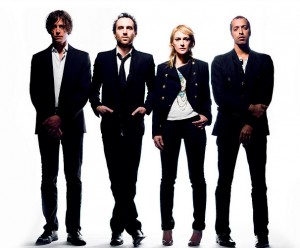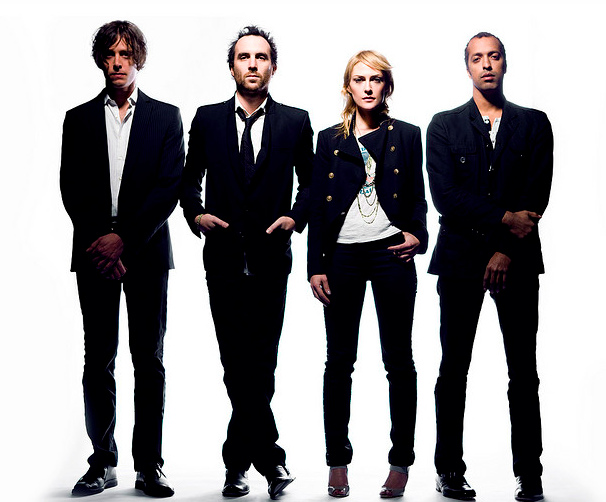 So here we were, Saturday in Manchester. Metric‘s new album Synthetica has been out for a week or two. Not unexpectedly it went into the Canadian charts at number 2, but also, and more significantly, entered the US Billboard chart at 12. The band are over on our side of the pond, zig-zagging back and forth between London and Amsterdam, with a neat side trip up to see us lovely folks up north. We ourselves have been in town since early, enough to for a stroll past tonight’s Ritz Theatre venue mid-afternoon, in time to catch the first two fans queuing up outside at around 4pm, both wearing the tee-shirts, not of Metric themselves, but of related Canadian acts Stars and Feist. We exchange a few words, wander off, then come back at our allotted time and are asked to please wait in this alleyway alongside the theatre. OK, whatever you say, you’re the management…
So here we were, Saturday in Manchester. Metric‘s new album Synthetica has been out for a week or two. Not unexpectedly it went into the Canadian charts at number 2, but also, and more significantly, entered the US Billboard chart at 12. The band are over on our side of the pond, zig-zagging back and forth between London and Amsterdam, with a neat side trip up to see us lovely folks up north. We ourselves have been in town since early, enough to for a stroll past tonight’s Ritz Theatre venue mid-afternoon, in time to catch the first two fans queuing up outside at around 4pm, both wearing the tee-shirts, not of Metric themselves, but of related Canadian acts Stars and Feist. We exchange a few words, wander off, then come back at our allotted time and are asked to please wait in this alleyway alongside the theatre. OK, whatever you say, you’re the management…
After a short few minutes, as we squint into the sun, we see a couple of familiar figures coming down the box-gorge between the warehouse buildings. Sure enough it’s Emily Haines and Jimmy Shaw, and they’re ready to talk as bluntly as you like about their lives, and particularly their view of the ‘industry’; the things that have led them to do things very firmly their own way, even at the expense of being seen as slight oddities. Most record deals are a ‘scam’ apparently.
Slightly surreally, Emily suggests that we take ourselves for a leisurely walk along the towpath of the Rochdale Canal onto which the theatre backs. It’s a sunny backwater, and a quiet evening to stroll, you’d never guess that we were only 500m from the bustle of Canal Street itself. Just to add to the atmosphere, we’re followed by a video camera, recording our every move.
I thought I’d break the ice by asking whether something was true that I’d read, that Emily purports to psychoanalyse those who come to interview her. In fact I asked her if this was ‘crap’?
Emily – Well you see a lot in the way that people ask questions, including the question that you just asked. It goes two ways doesn’t it. There sometimes seems to be a feeling on the part of the interviewer that they are behind bullet-proof glass. I just see human beings.
Jimmy – Mike, it seems like you must be either scared of being psychoanalysed, or really into it? It’s hard to tell.
There was laughter all round, but it’s just as well to be up front about these things. To be a bit more conventional, I asked them about the record, how they had arrived at this point for Synthetica.
Emily – I think there’s a concise answer. Ten years, five records.. Putting records out ourselves; gradually, slowly over the years gaining more and more control over our lives and our art. Jimmy building his own studio. Finally having time to make the record that we wanted to make. And it’s very much on par with the vision we set out with when we started this whole project. It was to try to create something really beautiful, that is cohesive and thought-provoking.
How does it differ from Fantasies?
Emily – You evolve.. it’s like asking how is 2009 compared to 2012. It was a very different time then. Obama had just been elected, whereas 2012 is a much darker time, there is a lot of anxiety, fear and unrest in the world. So it’s quite a different tone. Musically you evolve and absorb what is around you.
Jimmy – we were also on very unsturdy ground when we were making Fantasies…
Emily – ..true..
Jimmy – …we were unsure of our future, and we were at a bit of a do-or-die moment. If we hadn’t achieved something with Fantasies, I think we would have had a very different future. So, going into making Synthetica, I don’t think we were feeling that sort of unrest or unsteady footing, you know? I think we knew where we were, and we were more at peace with it, confident with it.
So Fantasies was a real watershed?
Emily – I think so. I mean the fact that we released it ourselves in the United States, and achieved 5 radio singles off that record. It put us in a different position in relation to the whole music industry, because we finally proved what we could do on our own, and it allowed us to form partnerships on terms that we felt were acceptable. I mean, it feels like we had (previously) met with every label. And I’ve always felt that the standard music record deal is such a scam. It’s harder path the one we taken, but in the end, what you earn, no one can take away from you.
That something is going to ask you, your view of the industry model. When we met before, you spoke about.. not exactly sticking it to them…?
Emily – A little bit! If you look at the history of music, there are so many cases, more than not, where really wonderful passionate artists have been exploited for the fact that they love what they do. The whole principle of potential. I mean, they come and get you when you haven’t proven it yet, and then you can’t prove that they didn’t do it all for you. That’s the real bind that most musicians get stuck in. We’ve been in a much happier, more positive place, to know that you’re free of that.
Jimmy – it’s kind of interesting to know that if you fail, it’s your fault
That’s kind of putting yourselves on the line…
Jimmy – It’s just being honest. I don’t want to feel like a victim if I fail. I want to feel responsible for my own victories and failures.
Do you feel there is too much whinging then?
Emily – The expression we’ve used in the past is that it’s like trying to be a detective in your own life, trying to figure out exactly what’s going on; where the money is coming from; what’s going on with your travel. You live in a constant state of confusion. It’s almost like being a drug addict or alcoholic – it takes years to figure out what happened and by then, in the past, what would happen is that the company would be just fine but the musician would end up in a bathtub somewhere. So it’s just taking responsibility for our own lives and not falling for that pathology, omebody saying “I’m going to make you into this” Even the ones we see that are successes are so statistically unlikely. As much as we’ve had hard times, and it won’t always be easy, it was just the only way for us to do it.
It sounds like you’re feeling really positive. Which is interesting because the track I really picked up on from the new record and played over and over again is ‘Dreams So Real’. I love it, but at the same time it feels post-something… some sort of hopelessness. Is that what I should be getting from it?
Emily – Well let’s look at the world. What the state of things is. Also from a personal perspective; I mean we’re not living in a time where artists are expected to, or are given the chance to lead the way about things like social justice; consciousness; awareness of larger issues that we are facing as a planet. I mean, people like to bitch about Bono but nobody bitches about the people that do nothing. No one saying to them “you’re just really fucking rich and you do nothing for anybody” No one has a problem with that for some reason. This song is addressing the fact that part of the reason I got into music was hoping that I could make a difference and I don’t know that I necessarily really have.
I think you’re being a bit unfair on yourselves
Jimmy – I think it’s more about the time. It’s not about putting it on us. It’s just that in 1971 some of the greatest musicians in the world were holding warring countries leaders in their hands….. And now you’re expected to turn up to the music video awards in a giant cupcake. Essentially, the same level of stars, that’s what they’re doing now. So good luck with trying to change the world in any way!
Something else you said to me before, that you thought you were the last band in the world doing it for love?
Emily – It’s not a diss on any other band. I’m sure there are people who also love what they do. But the thing about a lot of these topics is, it’s a serious topic, but I’m not complaining. I’m just not into being an idiot. We have so much respect for our audience, all over the world. They understand, you understand, you get it. You listen to the record, you look at the artwork, you get the connection, you understand. We are fine. We’re kind of an exception, we’re a bit isolated, but that’s okay. It’s hard to keep your heart open when you’re surrounded by people who seem to have very different reasons for doing what they do.
Another band that I regard as highly as you guys, if I’m allowed to say that, and come from a similar place, is Stars. I saw you are both playing at the Austin City Limits Festival in October and I wondered if that would be a sort of ex-Broken Social Scene get-together? (Stars, Feist, BSS, Metric have all played together over the years, the common factor I’d always thought was a spell as part of the BSS ever-evolving line-up)
Emily – They’re really dear friends of ours
Jimmy – The thing about Social Scene that happened was that – I was playing baseball with 2 guys from Stars when I was like 7 years old
Emily – and all these bands existed before Social Scene
Jimmy – and Social Scene was what happened because all these bands existed right next to each other. It’s amazing that we still have these friendships with those guys. We’re doing a whole national Canadian tour with Stars in the fall, which is a very special thing for us. When I first had a conversation with Torq (Campbell) and Chris (Seligman) and said I’d be so honoured if they could do it, we felt it was like a victory for our neighbourhood park
Gosh, I’m tempted to pay the plane ticket for that one
Emily – Do it, it won’t disappoint.
Jimmy – But those relationships are rare…
So how’s the tour going for you? You were in London yesterday?
Emily – Yeah, we were. We were in Shepherd’s Bush, then Paris. We just popped in to say hello around the release. We have to continue back to the US and Canada and then on to Australia, Singapore, Istanbul. We’re just getting started, then in the fall we’ll do our proper arena tour. It’s gonna be a fun year
And you’ll be playing in South America I guess?
Jimmy – Not till next year
Emily – It’s just trying to schedule everything
The reason I ask is I get the feeling South America is really important area for you. Didn’t you stay there for while writing as well Emily?
Emily – Yes it’s been inspiring as well…really supportive
Jimmy – We had some good times there, some amazing shows in Mexico City
How risky was it giving Lou Reed to do that vocal? Or is that something I shouldn’t ask?
Jimmy – No, no. That’s the best phrased that we’ve had that question.
Emily – It was pretty risky. Beyond his graciousness at saying yes… Jimmy was producing the session, and it’s quite intimidating to direct Lou Reed in the studio, but you know…
Perhaps I can say it – his last collaboration didn’t go that well?
Emily – I know. I think this is some redemption, some pure classic Lou Reed that we all remember and that we love. There is nobody else that does it quite like him
What you think of Manchester, do you get time to see it?
Emily gestures, indicating the canal bank and the backs of warehouses and the theatre. There are a few straggling wild flowers growing against the wall. “This is it, this is all we manage”
I’m really interested in the whole Canadian music thing
Emily – yet there are some great bands coming up, and the whole reputation. It used to be, I mean when we moved to New York in the late 90s and said we were Canadian band, they would just laugh their asses off, but now people say OK, wow? There’s a lot of respect for Canadian music that happened, obviously not just us …
And by now sadly our allotted time was up and we had meandered our back along the canal to the stage door. I agreed with Emily and Jimmy’s sentiments – it had been more than interesting to talk to a band who have so resolutely done it their own way; who can be gracious but also brutally honest about what exactly it takes to be a successful, world touring rock band in this day and age.
As a footnote, that last question proved an interesting note to leave on, as when I checked my Twitter a couple of hours later, a Brooklyn based writer friend of mine who was at Pitchfork Festival had just tweeted “Pitchfork curators must be ‘secretly Canadian’: Grimes, Godspeed You Black Emperor, Japandroids, Feist, Purity Ring. Day one a success” . Clearly, the Canadians are gaining momentum.
Of course we stayed for the gig and you can read all about that, and look at the photos HERE





